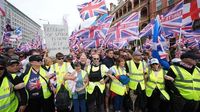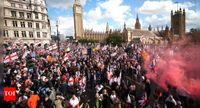Central London became the epicenter of unrest and political drama on Saturday, September 13, 2025, as up to 150,000 people gathered for the "Unite the Kingdom" rally led by far-right activist Tommy Robinson. The event, touted by organizers as a "free speech festival" and the largest of its kind in recent British history, quickly descended into chaos as clashes erupted between Robinson's supporters, anti-racism counter-protesters, and police tasked with keeping the peace.
The rally, which drew demonstrators from across the UK and Europe, saw crowds waving Union Jacks, English, and Scottish flags as they marched across the Thames and past iconic landmarks like Big Ben. Many attendees, draped in national colors, carried placards with slogans such as "stop the boats" and messages criticizing Prime Minister Keir Starmer and his Labour government. According to the Metropolitan Police, the turnout far exceeded organizers’ expectations, with estimates ranging from 110,000 to 150,000 people—making it one of the largest far-right protests in Britain’s history, as reported by multiple outlets including AFP and BBC.
But what began as a demonstration billed in defense of British culture and free speech quickly turned violent. The Metropolitan Police reported that 26 officers were injured, including four who suffered serious injuries such as broken teeth, a possible broken nose, a concussion, and a prolapsed disc. Assistant Commissioner Matt Twist described the violence as "wholly unacceptable," noting that officers faced "significant aggression" from some attendees: "They were assaulted with kicks and punches. Bottles, flares and other projectiles were thrown," he said, as quoted by Sky News.
Police made at least 25 arrests on charges ranging from violent disorder and assault to criminal damage. The violence erupted as some protesters attempted to breach police cordons and enter "sterile areas" near a rival "Stand Up To Racism" counter-protest, which attracted about 5,000 participants. Officers, reinforced with riot shields and helmets, struggled to keep the two opposing groups apart, particularly on Whitehall and Trafalgar Square, where projectiles were thrown from both sides and at least one police horse was struck by a glass bottle.
The scale and intensity of the violence drew swift condemnation from government officials across the political spectrum. Home Secretary Shabana Mahmood vowed that "anyone taking part in criminal activity will face the full force of the law," echoing the sentiments of Business Secretary Peter Kyle, who told Sky News that while the right to protest was "proof that we live in a country where free speech, free association, is alive and well," violence against police was "unacceptable and those people should and will pay a price for it."
Prime Minister Sir Keir Starmer, writing on X (formerly Twitter), reinforced the nation’s commitment to peaceful protest while decrying the assaults on police officers and the intimidation of citizens based on their background or skin color. "Britain is a nation proudly built on tolerance, diversity and respect. Our flag represents our diverse country and we will never surrender it to those that use it as a symbol of violence, fear and division," Starmer stated, as reported by Sky News.
The rally’s focus on migration and national identity was unmistakable. Tommy Robinson, whose real name is Stephen Yaxley-Lennon and who has a long history of far-right activism and criminal convictions, declared the event the "biggest freedom of speech" rally in British history. In a hoarse voice from shouting, he told the crowd, "The dam has well and truly burst. The cat is out of the bag and there is no putting it back in. The silent majority will be silent no longer," according to Sky News. Robinson also claimed, in a post on X, that "over THREE million patriots hit central London today in a force of patriotism never seen before," though police estimates were far lower.
Robinson’s speech was echoed by other far-right figures from Europe and North America, including French politician Eric Zemmour, who warned of the "great replacement" of Europeans by migrants from the south and Muslim cultures. The event also featured tributes to the slain American right-wing activist Charlie Kirk, with attendees holding placards bearing his image.
Perhaps the most surprising moment of the day came when tech billionaire Elon Musk, CEO of Tesla and owner of X, appeared via video link to address the crowd. Musk criticized the UK government’s handling of migration, calling for a "change of government" and a dissolution of parliament. "Something's got to be done. There's got to be a dissolution of parliament and a new vote held," Musk told attendees, as quoted by Sky News and The Tribune.
Despite the charged rhetoric and outpouring of nationalist sentiment, the rally was not without its ironies. As noted by The Tribune, some protesters were filmed eating Indian food—curries and bhajis—from street stalls like "Curry Shack," even as they denounced immigration and multiculturalism.
The "Unite the Kingdom" rally unfolded against a backdrop of heightened tensions over migration in the UK. In recent months, anti-migrant protests have flared outside hotels housing asylum-seekers, sometimes turning violent. The debate has been further inflamed by high-profile criminal cases involving migrants and by the ongoing controversy over small boat crossings in the English Channel. Far-right parties like Reform UK, led by Brexit supporter Nigel Farage, have surged in the polls, reflecting a broader rise in anti-immigration sentiment.
Observers noted that Saturday’s massive turnout reflected not just the mobilizing power of Robinson and his allies, but also the convergence of multiple far-right factions and newcomers, as King’s College London’s Georgios Samaras told AFP. The anti-racism charity Hope Not Hate described the event as "probably... the largest far-right demonstration ever in Britain."
Throughout the day, police maintained a heavy presence, deploying around 1,000 officers to manage the crowds and prevent further escalation. A Metropolitan Police spokesperson summed up the day’s events: "There is no doubt that many came to exercise their lawful right to protest, but there were many who came intent on violence. They confronted officers, engaging in physical and verbal abuse and making a determined effort to breach cordons in place to keep everyone safe."
As the dust settles on a tumultuous weekend in London, the fallout from the "Unite the Kingdom" rally is likely to reverberate through British politics and society for weeks to come. With government officials promising accountability for those who committed violence and far-right activists vowing to continue their campaign, the battle over Britain’s identity and future remains as fierce—and as unsettled—as ever.


